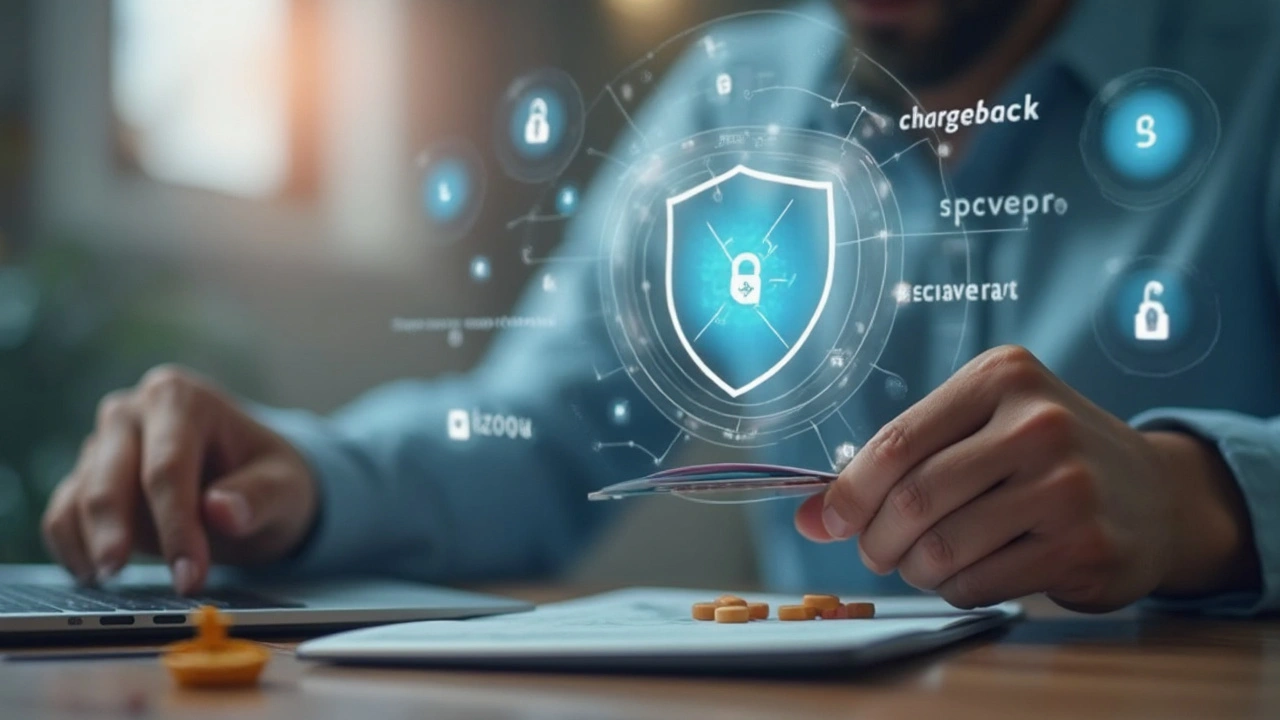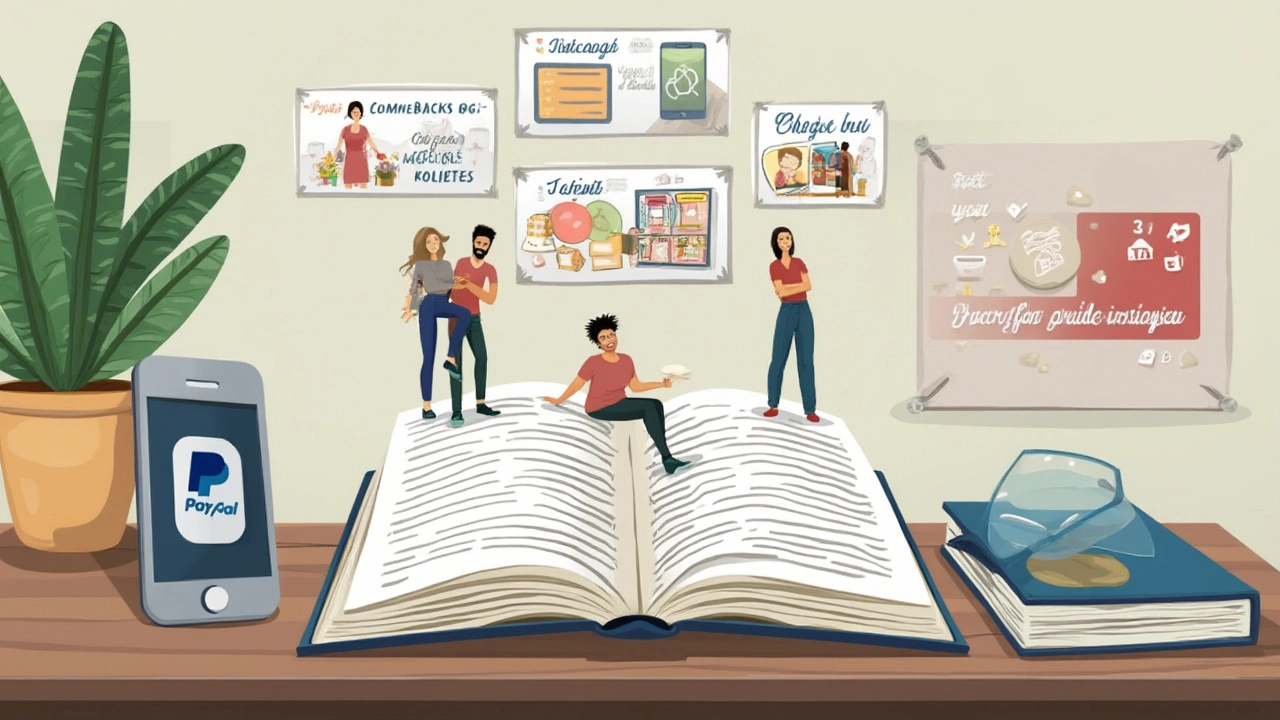Why Payment Safety Matters When Ordering From CanadaDrugsDirect
We live in a time when grabbing prescriptions from the comfort of your own couch is as normal as online grocery shopping. But here’s a fact that often puts people on edge: pharmacies like CanadaDrugsDirect operate online, and so do a lot of scammers. In Canada, credit card fraud losses surpassed $130 million in 2024. That’s a sharp reminder—your choice of payment method is not just a detail. It might protect you or leave you exposed.
Every time you place an order for medications or health products, your payment info is out there—card numbers, PayPal emails, maybe even bank details. If the pharmacy website is secure and reputable, you can breathe easy. But not all online pharmacies hold themselves to high standards. According to pharmacychecker.com, only a small percentage of Canadian online pharmacies have legitimate certifications. And cheap “deals” can sometimes come with high risks, like stolen personal data or unauthorized transactions. Many buyers aren’t just watching for fake meds—they’re also watching their bank statement.
The truth is, fraudsters have become experts. They mimic trusted pharmacies, send phishing emails that look like real order confirmations, or set up fake checkout pages. You might order allergy pills and find surprise charges for electronics you never bought. Real-life stories pop up all the time in consumer complaint forums. That’s why understanding payment protection (and spotting red flags early) is so important. Your payment choice can mean the difference between safe refills or a lengthy call with your credit card company’s fraud department.
But don’t let scary headlines push you away from the convenience of online pharmacy orders. CanadaDrugsDirect has loyal customers, and it’s possible to buy safely. Smart shoppers don’t just grab the first payment option—they compare, read up on guarantees, and keep their privacy top of mind.
How Credit Card Protections Keep You Covered
Most Canadians make their online pharmacy purchases with a credit card. Why? It’s not just because it’s quick. There’s a built-in layer of protection. Canadian law, along with the policies of Visa, Mastercard, and American Express, gives you peace of mind if the pharmacy shipment doesn’t arrive, comes damaged, or is not what you ordered. You should always check if your card offers “zero liability” on unauthorized transactions (most big banks do for both personal and business credit cards).
If you spot a dodgy charge from your CanadaDrugsDirect purchase, you have the right to file a chargeback. Chargebacks are straightforward: you tell your bank or credit card company you didn’t authorize the purchase (or didn’t receive the product as described), and they investigate. If it checks out, you get your money back. A 2024 Credit Canada survey found that 84% of respondents had successfully recovered funds from disputed online transactions via chargeback processes. That’s not just for lost packages—a chargeback can help if you’re billed incorrectly or double-charged too.
When paying by credit card, keep an eye out for https (the locked padlock in the browser bar) on the checkout page. CanadaDrugsDirect uses industry-standard SSL encryption. This means hackers can’t snoop in on your details while they’re being transmitted. Never share your PIN online—a card number and 3-digit code is all legitimate pharmacies should ever need. Some banks even let you set up “virtual” card numbers for one-off purchases, which expire after use. That’s a dream for privacy buffs or anyone nervous about data breaches.
If you’re worried about your pharmacy purchase showing up on your monthly statement, there’s good news. Banks are not allowed to disclose purchase details publicly, so your privacy is protected. Still, statements may mention “CanadaDrugsDirect” or a related processing name, so don’t use a shared card if you want total discretion.
Keep all order confirmation emails and screenshots of your transaction until your order arrives and you’ve checked it. If you have to dispute the purchase, your bank will want proof of your efforts to contact the pharmacy first. Write down customer service details—you should never need to go hunting for a phone number or email if an issue pops up.

Is PayPal Safe for Pharmacy Payments?
PayPal is a crowd favorite for its quick checkouts, but does it stack up safety-wise when buying from CanadaDrugsDirect? The statistics say yes—for the most part. PayPal reports a fraud rate of less than 0.3% across its global transactions. They use advanced AI to sniff out dodgy payments and offer “Buyer Protection.” This means if you pay for prescription meds but something goes wrong—maybe the delivery never comes—you can file a claim. PayPal investigates, and if you win, your money gets refunded.
PayPal’s main advantage is that you never have to reveal your actual banking or card details to the merchant. CanadaDrugsDirect never sees your card number. You just log in, pay, and your financial details stay locked down. That’s why many privacy-conscious shoppers use PayPal, especially when dealing with unfamiliar sellers.
One quirk: not every pharmacy supports PayPal due to rules about controlled substances and prescription drugs. CanadaDrugsDirect generally allows PayPal for eligible purchases, but always double-check the accepted payment options before you fill your cart. If PayPal’s not offered, consider alternatives like credit cards with robust fraud protection—or look for another pharmacy with more options.
It’s good practice to enable two-factor authentication in your PayPal account. This adds a strong layer of security, requiring you to enter a one-time code every time you log in. Scammers love to phish PayPal passwords, so always access your account by typing “paypal.com” directly in your browser, not by clicking email links. And, just as with credit card payments, keep your receipts and screenshots until your meds arrive safely.
PayPal disputes are usually resolved within 30 days, and you can escalate a complaint if you’re not satisfied with the initial outcome. Take note: Buyer Protection doesn’t always cover custom or non-tangible meds (think open bottles or digital prescriptions), so review the terms for your specific purchase.
The Scoop on Alternative Payment Methods
Maybe you prefer to keep your credit card tucked away, or PayPal just isn’t an option. What else is available for safe checkouts at CanadaDrugsDirect and similar pharmacies? There are a few increasingly popular choices:
- Interac e-Transfer: A favorite with many Canadians, this option lets you pay directly from your bank account, no third-party needed. But unlike credit cards, e-Transfers don’t always come with the same strong chargeback protections if you end up with an issue. Still, it’s quick and keeps your card numbers off merchant servers. Never send money to a personal email address—always double-check the pharmacy's verified account on their website before sending a transfer.
- Cryptocurrency: Some online pharmacies have started accepting Bitcoin or other cryptocurrencies. This can be anonymous and sometimes comes with special discounts. But if anything goes wrong, there’s usually no way to get your money back. The transaction is irreversible, so use extreme caution and only trust well-reviewed pharmacies with clear refund policies.
- Wire transfers: Rarely, some pharmacies allow customers to pay by bank wire, especially for large orders. The main risk here is that unlike credit cards, once a wire is sent, it can’t be easily reversed. Stick to this method only with established, reviewed pharmacies—and get all instructions directly from the official website to avoid fraud.
- Prepaid/Virtual Cards: You can buy these through your bank or at retail stores. They’re handy if you want a spending cap or worry about your real credit info being stolen. Check if CanadaDrugsDirect accepts prepaid cards—policies can change, so ask support first. These cards usually offer similar dispute protection to normal credit cards.
Whatever you choose, review the pharmacy’s payment page each time—scammers are getting inventive, and fake checkout screens can pop up that capture your payment info. Make sure you’re browsing on a secure connection, and just for peace of mind, don’t use public Wi-Fi for sensitive transactions.
Unsure which pharmacy to trust for meds and payments? Several guides compare services and payment safety. For a full rundown of alternatives and how to buy from CanadaDrugsDirect safely, check out this ultimate guide to online pharmacies in 2025. It's packed with tips and up-to-date info.

Practical Tips to Keep Your Payments Trouble-Free
Getting the best safety isn’t only about picking the right payment type—it’s everything you do around it. Want an expert checklist that’ll boost your confidence on every pharmacy order? Here’s what has worked for thousands of Canadians (myself included):
- Verify, verify, verify before you hit “Pay.” Look for “https” and genuine trust badges in the browser bar. If you’re unsure, check if the pharmacy is listed in PharmacyChecker, the National Association of Boards of Pharmacy, or the Canadian International Pharmacy Association.
- Never email your payment or prescription info. A reputable pharmacy will always use a secure online form.
- Keep your device virus-free. Malicious browser plugins or computer viruses can record keystrokes and steal your logins during checkout. Run regular scans on whatever phone or laptop you order from.
- Create strong, unique passwords for your pharmacy accounts—and avoid auto-saving them in browsers if you share your computer.
- Enable purchase alerts with your credit card or PayPal account. You’ll get instant notification if anything odd pops up, so you can act fast.
- If you’re ever asked for extra fees after paying, stop and contact the pharmacy directly. Scammers often pose as “customer support” to trick buyers into paying twice.
- Look for clear contact information and a genuine street address on the pharmacy’s website. If you can’t find it, or if customer reviews sound robotic, don’t risk your payment info.
Keep a dedicated card or account just for online pharmacy purchases. If something fishy happens, it’s easier to shut down one card than to untangle your whole bank account. And never ignore small charges you didn’t make—fraudsters will sometimes “test” a stolen card with tiny unauthorized transactions before going bigger.
You don’t have to sacrifice convenience for safety when using CanadaDrugsDirect or similar pharmacies. Nearly 79% of Canadians over 40 ordered prescription medications online in 2024, according to a CIBC health trends report. Most had no payment issues as long as they kept their wits about them, used strong passwords, and stuck with secure payment channels. You can do the same—and share these tips with friends or family who might be nervous about their first online order.

Jenn Zuccolo
July 18, 2025 AT 15:31I've always felt that when it comes to online pharmacies, safety and trust are the paramount concerns. It's fascinating how methods like credit cards not only offer convenience but come with an added layer of protection through chargebacks if anything goes awry.
PayPal, for instance, serves as a buffer that often shields the buyer against fraud, which feels like an indispensable tool in today's digital marketplace. The privacy aspect is another dimension altogether—knowing your personal and medical details won't be exposed recklessly is vital.
Exploring alternative payment options could be a wise move as technology continues to evolve, potentially offering even more secure mechanisms. Overall, being informed empowers customers to shop smarter, mitigating risk while enjoying the convenience of online pharmacies.
Courtney The Explorer
July 19, 2025 AT 14:41Honestly!!!!!!!!!! Everyone needs to STOP blindly trusting these so-called "safe" payment methods without really knowing what’s underneath!!!!!!!! Credit cards are NOT a magic shield against fraud, folks!!! There are tons of clunky loopholes and ugly hidden fees!!!!! And PayPal??? More like PayFail, if you ask me!!!
I cannot even comprehend why anyone would gamble with their hard-earned cash and personal info with some sketchy online pharmacy, especially from Canada!!!!! Let's prioritize real safe domestic options instead of blindly supporting cross-border, unregulated third parties!!!!!!
Seriously, we need to be smarter and more vigilant, not naive!!!
Ashleigh Connell
July 20, 2025 AT 13:51What a thoughtful overview! It's refreshing to see someone break down the payment methods with such clarity. I mean, in this chaotic digital age, knowing the nuances of chargebacks and privacy is like having a secret map through a dense forest.
We often get caught up in the flashy promises of convenience without thinking about the underlying safety nets. It's good that alternative payments are in the mix; adapting to innovation is crucial.
Super important piece of advice for anyone considering ordering meds online: stay informed and don’t rush decisions. Patience and knowledge go hand in hand!
Erin Knight
July 21, 2025 AT 13:01Let's be honest here, this guide is somewhat helpful but doesn’t quite dive deep enough into the shady realities of online pharmacy payments. Sure, credit cards and PayPal offer some protections, but the industry's rife with gaps and blurred lines that make true safety almost an illusion.
There are tons of posts and articles out there repeating the same surface-level tips without addressing the bigger picture: what happens when those safeguards fail and the buyer is left stranded?
We deserve a more comprehensive, no-nonsense breakdown of scam prevention that doesn’t just skim the surface.
Kavita Jadhav
July 22, 2025 AT 12:11This topic really resonates with me because I know how scary it can be to buy medicine online - especially when it's for someone you love. The guide’s emphasis on chargebacks and privacy protections is comforting, showing that we can protect ourselves thoughtfully.
But it’s also vital to remain aware of the evolving tactics scammers use. Knowledge is a powerful shield, and being open to alternative payment options can offer new layers of security.
At the end of the day, the balance between convenience and caution is delicate, and guides like this help create awareness for safer choices.
Tony Halstead
July 23, 2025 AT 11:21Reflecting on this, one can’t help but consider the philosophical underpinnings of trust in digital transactions. We extend our faith to entities like credit card companies and PayPal, betting on their accountability, yet the invisible web of risks remains.
Interestingly, chargebacks act almost like a modern-day safety net, a social contract between buyer and institution. Yet, this relies heavily on the consumer's ability to navigate terms and conditions—often a daunting prospect.
Hence, knowledge itself becomes a kind of ethical empowerment, enabling us to make better decisions in the marketplace of health and well-being.
TRICIA TUCKER
July 24, 2025 AT 10:31Wow, this guide is really coming in clutch for anyone thinking of ordering meds online for real!!! It's so crucial to know how credit card protections work because it saves you from getting scammed big time.
Like, PayPal is totally underrated sometimes, but it seriously gives you peace of mind when buying from places overseas. And the part about chargebacks blew my mind because I didn't realize how much power we have as shoppers to dispute shady transactions.
Honestly, the privacy tips are so important too since no one wants their sensitive data floating around sketchy webs. Gotta keep those options open and know what to do if something goes south!!
Dave Tu
July 25, 2025 AT 09:41I can’t say I’m impressed with the typical discourse around online pharmacy payments. It’s always the same song: 'trust your credit card, use PayPal, blah blah.' But no one addresses the fundamental skepticism you should have when handing over sensitive data.
Frankly, relying on optional chargebacks or dispute mechanisms is reactive at best. Proactive security? Barely mentioned. It’s a flawed system, propped up by commercial interests aiming to erase responsibility from themselves.
This guide is helpful only if you swallow the premise that these systems are trustworthy in the first place—which, realistically, they’re not entirely.
Johnna Sutton
July 26, 2025 AT 08:51Ugh, can we please stop pretending everything about these online payments is safe just because some website says so? I’m telling you, the second you type your details, your info might be harvested or sold, and no fancy credit card protection is gonna stop that, mkay?
And like, PayPal has its own sketchy reputation – it’s not all rainbows and unicorns. These companies talk about privacy but the reality is complex and downright scary sometimes. The only way to stay truly safe is to stick to the good old local pharmacies and avoid all this cross-border drama!!
End of rant.
Vinay Keragodi
August 6, 2025 AT 22:51Hey, just popping in to say that I'm intrigued by the alternative payment options mentioned here. In my experience, sometimes sticking strictly to credit cards isn't the best route, especially considering the fees and time involved in disputes.
Digital wallets, cryptocurrencies, or even escrow services might provide interesting alternatives for safer transactions, though they come with their own learning curves. Does anyone have experience using these in the context of reputable online pharmacies?
Understanding these emerging methods could really broaden our toolkit against fraud.
Anil Karwal
August 17, 2025 AT 14:41Not much to add, but I've found that staying calm and patient when dealing with online pharmacies helps a lot. Rushing into payments without researching can lead to mistakes, so guides like this one really help widen awareness about safe options.
Personally, I avoid any platform without clear policies and secure payment gateways — that's a red flag for me every time.
Overall, being an informed, cautious shopper is our best defense in this space.